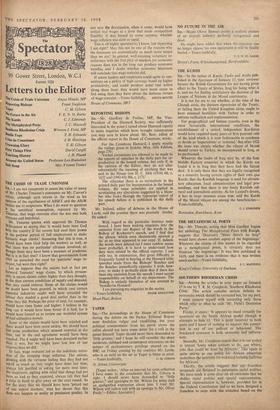SIR,—Mr. Geoffrey de Freitas, MP, the Vice- President of the
Hansard Society, was sufficiently interested in the point I raised about Hansard reports to make inquiries which have brought reassurances you may care to know about. Mr. Bear, editor of the official report in the House of Commons, wrote :
For the Commons Hansard, I apply strictly the rulings given in Erskine May, 16th Edition, page 270: 'Verbal corrections are allowed to be made in the reports of speeches in the daily part for re- production in the bound volume, but only if, in the opinion of the Editor, they do not alter substantially the meaning of anything that was said in the House (see H. C. Deb (1914) 60, c. 1632 and (1942-43) 386, c. 217).'
The reference there is to corrections in the printed daily part for incorporation in the bound volume; the same principles are applied in scrutinising any alterations suggegted by a Mem- ber who looks through the typescript report of his speech before it is published in the daily part.
Mr. Ireland, editor of debates in the House of Lords, said the practice there was precisely similar. He added : With regard to the particular instance men- tioned, I have been making enquiries into the omission from our Report of the words in the Bishop of Rochester's speech, and I find that the phrase 'which even shamelessly sported a tie' at no time appeared in our copy. lf, indeed, the words were uttered (as I must confess seems most probable), it is hard to understand how they were missed by the official reporter. I can only say, in extenuation, that great difficulty is frequently found in hearing at the Hansard table speeches made from the Bishops' Benches and the Benches immediately opposite. I wish, how- ever, to make it perfectly plain that if there has been a'ny omission from the speech I must accept responsibility on behalf of my department. The Bishop is entirely blameless of any attempt to 'bowdlerise Hansard.
I am pursuing my enquiries in the matter.
Moor Plan, Bolton






























 Previous page
Previous page